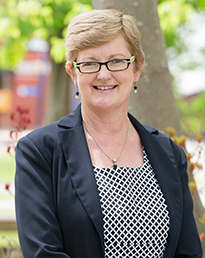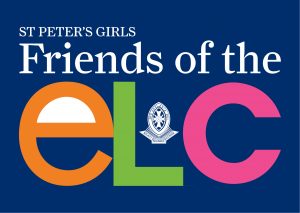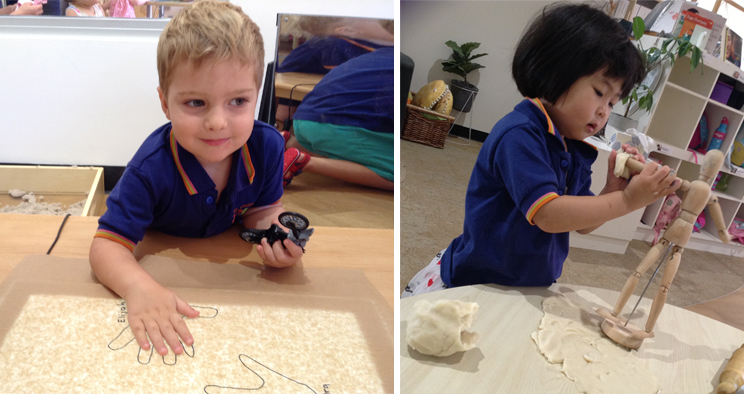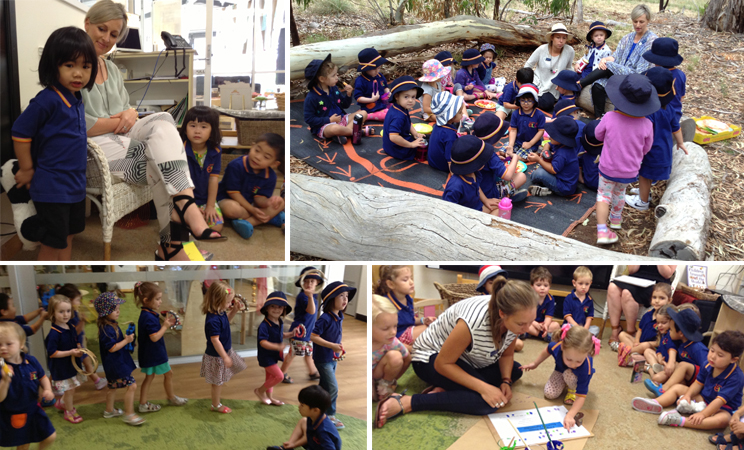
From the Director of Early Learning
Dear Families,
It has been wonderful to connect with so many of you personally over recent weeks, either at the centre as you have arrived with your children or at one of our special events. In particular I enjoyed sharing our teaching and learning outline with you at our very important Information Evening. It was such an informative time and the feedback from families about the teachers’ presentations was fantastic. We were able to share not only what we teach but how we do it. The iMovies and photos that teachers made, demonstrating the learning with concrete examples, gave life to our presentations. We hope that parents can continue to be involved in this essential part of our ELC life.
In addition to this more formal event, we hosted a morning tea which provided families with a chance to connect with each other and their teachers. The Friends of the ELC are to be congratulated on the opportunities they provide for our community to connect.
We continue to ask families for feedback about making information accessible. If there are ideas that you may have please do not hesitate to speak with me about how we can improve on this. Hopefully these fortnightly newsletters will continue to be a major source of information sharing and an invitation for you to be part of our journey with us.
My next challenge as Director is to ensure that the children now settle into established routines and that the inquiry learning that we have so carefully created for the term allows them to deepen their understandings and find ways that they can express their learning processes. Together, the educators are observing and analysing individual children and groups of children to ensure what we are proposing as investigations are essentially linked to our observations. Our intentional planning guides the inquiry and we are then prepared for the extraordinary question or provocation that comes from the child and we know how to respond and where to go with it. This is the cycle of learning!
Please take the time to share the displays of documentation in the rooms and read the ELC Handbook which has been distributed across the rooms.
Kind regards,
Kate Mount
Meal times at ELC

Learning about healthy lifestyles contributes to children’s sense of wellbeing and builds their confidence in themselves. It is our role as educators, parents and families to help children learn about positive eating and exercise for a healthy life.
Joy of being together
Meal times provide wonderful opportunities for children to practise social, language and self-help skills. At the ELC, the educators ensure that meal times are pleasant, relaxed experiences. Sufficient time is given for children to interact with each other and enjoy their food. We place value on the educators sitting with the children, acting as role models for healthy eating habits, and talking about what they are eating, where it comes from and how it was prepared. We promote children’s self-help skills by encouraging them to open their own lunch box, unwrap their meal or ask a peer to assist them if needed.
Lunch Boxes
Many families ask us about the types of lunch boxes that are best suited for ELC and ideas for items to include for their child’s lunch. Please see the photographs above for some lunch box ideas and food items that have been recommended to us by the children and families. Some children are fussy eaters and choose not to eat much while at ELC. As this can cause some concern for families we encourage you to look at the portions you are providing for your child and reduce them slightly and see if this helps. Too much choice and large portions can be overwhelming for children at meal times. Please remember that children eat different quantities, some more or less. The examples in the photographs above are samples of lunch boxes from across the centre and are provided as inspiration for ideas.
Water in bottles
We ask that each child brings a labelled bottle of water to ELC each day they attend. The children have access to their water bottles throughout the day and the educators give additional reminders for them to have a drink.
Involving children in Meal Preparation
We highly recommend that you include your child in food preparation times in the home. This sparks interest and curiosity towards the foods they are eating and they will be more inclined to try new foods if they have been involved in the process of preparation. Please note that children often need to try new foods on numerous occasions before they may enjoy it.
Food Safety
Including an ice pack in your child’s lunch box helps keep food safe and cool for lunch time. Please can you ensure that your child’s lunch is kept in an insulated lunch bag and or includes ice packs or a frozen drink bottle inside the lunch box. If preparing lunch ahead of time, we recommend keeping it in the fridge until leaving for ELC. If you require your child’s lunch to be placed in the fridge, please communicate this to your teacher.
Save the Date
- 10 March : ELC Twilight Picnic from 5pm on the lawns
- 3 – 5 April : ELC Photos in the mornings
- 3 – 5 April : ELC Parent Teacher Conversations
- 14 April : Easter and School holidays
- 18 – 28 April : Vacation Care Program
We trust that all families have collected their 2017 Key Dates Fridge Magnet from your room.
From the Friends of the ELC

Thank you so much to all the families who supported our recent Welcome Morning Tea.
It was a huge success despite the heat. We enjoyed meeting up with everyone and look forward to our future events.
News from the Stonyfell Room

Inquiry: Exploring our identity
“Today you are you! That is truer than true! There is no one alive who is you-er than you!”
– Dr Seuss
This term in the Stonyfell Room our inquiry focus is exploring how groups can shape our identity. In order to recognise that we are part of a group we must first know who we are.
We have begun our inquiry by working with our children to explore their identity. This process is also allowing us as the educators to get to know the children and deepen our understanding of who they are.
Our children have a very strong sense of self this is linked to their development and at this age they are keen to express many facets that make up who they are.
This can include:
• In sharing their name
• Identifying their family members
• Their age
• Likes and dislikes
We have been using our morning welcome time to support our children to further explore these parts of our identity. Along with these intentional teaching moments, we have also provided suggestions in our environment to allow our children to make their own meaning as to expressing there identity.
We believe that it is integral to link our learning across the week and an example of this is our art experiences with Miss Caterina.
Our children have been creatively exploring other ways to express who they are so examples of this are:
• The use of mirrors
• Printing of our hands
• Creation of self-portraits using a range of collage materials
We would like to invite you to come and see some of the documentation that has been created to show the learning that has occurred as part of these art experiences. This can been found in our Atelier space.
Laura Reiters
Stonyfell Room
News from the Bell Yett Room

It is our hope that each child who comes through our door
joins a community of children, families and teachers
engaged in the joy, learning and wonder of childhood.
A very big thank you to the families who were able to join us at our recent Parent Information Night. It was a wonderful opportunity to share your child’s learning with you. We are amazed by the rich and engaged learning that has happened in just three weeks. Please enjoy this short movie that provides a snapshot of our early inquiry investigations in the Bell Yett Room.
During our recent explorations of identity, it has become obvious that the children see their handprint as an important symbol that reflects who they are. We are inviting the children to create representations of their hands through photography, printing, shadow and mark making. Comparing their hands with the hands of others opens opportunities for children to see and share many perspectives of identity.
You might like to continue this learning at home by looking at your hands together. Some things you could talk about include:
• What do you notice about our hands?
• How are our hands the same?
• How are our hands different?
• Whose hand is bigger/smaller?
• What is special about your hand?
We would love to hear about experiences you share. Please feel free to email us with any snippets of conversations or photos.
Another way of supporting children’s exploration of identity, as well as developing their sense of belonging to the Bell Yett community, is through a family photograph. We would appreciate you providing us with a photo of your family which will support our learning in the room. This can either be a hard copy or via email.
Thank you for joining in, alongside of us, to support your child’s learning,
Leanne, Nell and the Bell Yett Team
News from the Ferguson Room

Thank you to the many families who joined us for our ELC Information Night. It was a wonderful opportunity to share our passion for our work with you, the children’s first and most important teachers.
In these early weeks we have been working on creating an Essential Agreement to guide our behavior in the room, and our conversations with the children have demonstrated how knowledgeable they already are about what it takes to feel physically and emotionally safe. We have reflected on all of the contributions to our group discussions to arrive at a set of beliefs about the way we want to be in the Ferguson Room:
• We will be kind, friendly and help our friends
• We will tidy up after we finish playing with something
• We will be careful and gentle with our resources
• We need to ask, wait and take turns
We have seen many examples of the children working on resolving conflict with others or returning to tidy up after themselves when they have been reminded of their commitment to the Essential Agreement. One of the parents shared with us that they also have an Essential Agreement at home. It would be very interesting for us to know if other families have done something similar so we could highlight links between home and school and how we can belong to different groups that have many shared values. Please email me if you would like to share something with us: mangel@stpetersgirls.sa.edu.au
Another way in which we are making connections between home and school is in the sharing of home languages. Amy and Hannah have been teaching us words and songs in Mandarin and Bea has taught us to say Good Morning in Tagalog, the Filipino language. Bea’s Mum Joanne is teaching us a children’s song in Tagalog. This is such a rich opportunity for developing appreciation for languages and other cultures, as well as gaining insight into who we are as a group in the Ferguson Room. It also conveys a strong message to the children that we all have ownership over the teaching and learning in our context and that knowledge is built by working together.
Mel Angel
Ferguson Room
News from the Hallett Room

The strength of the team is each individual member. The strength of each member is the team (Phil Jackson).
Thank you to those families who attended the Parent Information Night last week. We appreciate your attendance and value sharing your child’s learning with you.
As we move into Week 4, we have been able to reflect on some of the discussions about our Essential Agreement. The children are showing a lot of awareness about these important ideas, but beyond that we can hear children understandings about how a group need to cooperate, in order for the group to work together (function). As we work on ensuring we all have agreed on the ideas, children are beginning to remind each other of the part they play as individuals in the room. We are seeing leadership skills, kindness towards others and a sense of fairness coming to the forefront. Not only that, but we are hearing an awareness about other groups the children belong to.
“I’m allowed to pick flowers in my garden at home”
“But not at ELC”
“Because my mum and dad said I can at home”
As we look at this with a different lens, we see that children can articulate what their family group agree on (with or without a formal agreement!) and how that impacts their actions. We would love to hear from you on this. Do you talk about any differences that your family may have in comparison to ELC? Has the idea of different ‘rules’ come up – ‘My friend is allowed to do this at his home, why can’t I?’ for example.
The Hallett Team would very much appreciate if you have any examples of the children showing that group functioning depends on the individuals of that group.
The Hallett Team invite our families into our explorations by inviting you to share any anecdotes or observations that you have noticed of your children engaging in conversation about their ‘family agreement’ and that of the one at school. Has your child initiated an agreement at home for everyone in the family, or is this something you do together as a unit? When they visit their friends or extended family have they noticed that each ‘group’ may have different elements in their agreements? If you would like to share some examples with us this can be done through email, hand written note, informally at pick up or shared through photographs. We look forward to hearing from you.
Pam Reid
Hallett Room
